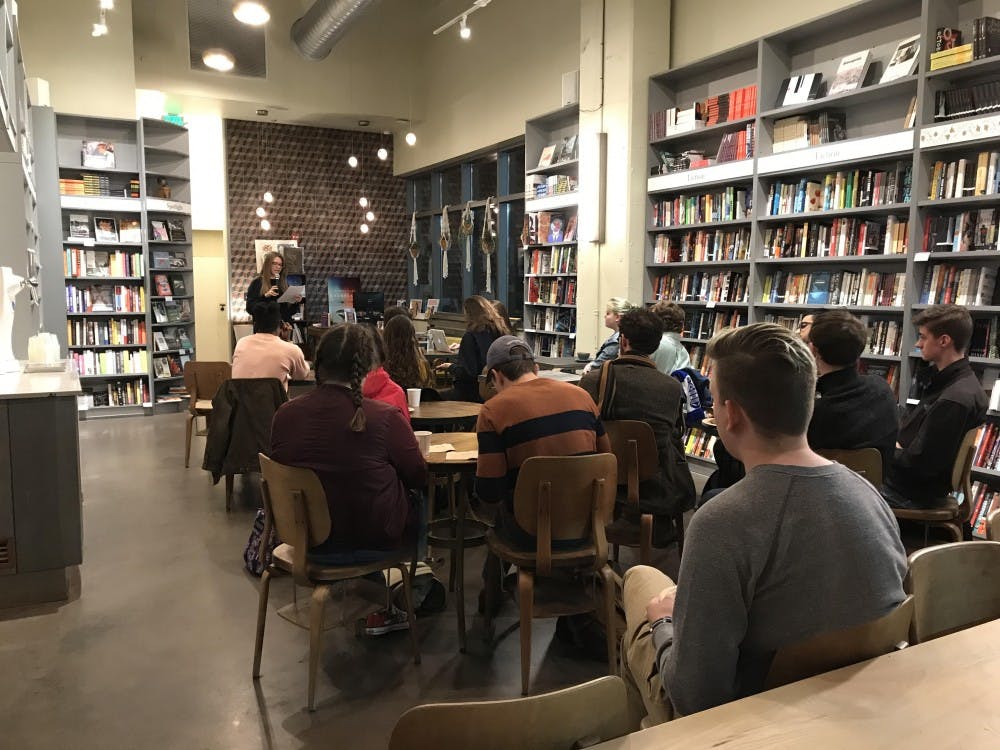On March 1, 2018, Hopkins Writing Seminars Professor Eric Puchner read from his new collection of short stories, Last Day on Earth, spoke with host Nate Brown, and answered questions from Brown and the audience. The event was held from 7-8:30 p.m. at the Ivy Bookshop in Bird in Hand.
Puchner debuted with his first short story collection, Music Through the Floor, while his second novel Model Home was a finalist for the PEN/Faulkner Award and won a California Book Award Silver Medal for fiction.
Last Day on Earth is his third book and focuses on family and its complications: a depressed woman tasked with taking her niece and nephew trick-or-treating; a teenage boy afraid that his mother may be a robot; a teenage boy who tries to save his estranged father’s dogs from going to the shelter; and a reluctant father who brings his baby to a party with coke.
The event began with a preliminary round of questions from Brown, who asked Puchner about the start of his career. Puchner stated that he sent in stories many times by mail, before online submissions were widespread. One story, which he had sent to The Atlantic, was rejected by the editor. But it was a good kind of rejection — a handwritten note, which came attached to the regular letter.
“I felt like I made it because I got a handwritten letter,” Puchner said.
When asked about whether he wanted to make editorial changes to his previous books, Puchner said that he was “mortified by some sentences.” But he also said that he is busy focusing on newer stories.
“Your writing gets better and better and better with each story that you write,” he said.
Talking about one of his stories, “Beautiful Monsters,” Puchner said that the story came to him in a dream.
“I saw a group of 35-year-olds who looked like children, seeing a grown-up for the first time,” he said.
Brown noted that Puchner’s characters all seem to have the desire to change or improve in some way.
In response, Puchner stated that he was, “preoccupied with the way our bodies betray us with age,” and mentioned his dislike of the idea of coming-of-age stories, saying that they were cliche and that people were always changing.
“Life is a series of disillusionment,” he said, laughing.
Then Puchner began reading through “Last Day on Earth,” a story with the same title as the book. After the reading, Brown began a second round of questions.
When asked about the locality of his stories, Puchner said that the details of Southern California fascinated him because of its bizarre and surreal nature: the cookie-cutter housing development, Spanish Colonial architecture, mini-malls and desert communities.
When asked if he wrote about places he had never been to, Puchner said, “I don’t write about places if I haven’t been to them... it’s not a moral issue... if you do it, more power to you. I’d just feel like a fraud.”
Brown also asked about the endings of Puchner’s stories, how characters who don’t seem fully resolved still seem to be in a better overall place than before. In response, Puchner asked, “How do you scratch an itch the reader has with irresolution?” He then inferred that one would need to “act a reserval that is a subtle form of a reprieve.”
Puchner also said that he sometimes leaves enough at the end of the story so that the reader would know that something would happen after the end that would complicate the situation.
“After all,” he said, “that happens a lot in life. Things aren’t tied up so neatly.”
During the Q&A, Puchner answered a question about how much of oneself one should put in fiction.
“One hundred percent of fiction of autobiographical... writing is about your own emotional experience,” he said.





